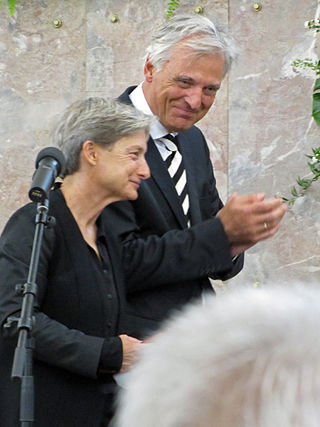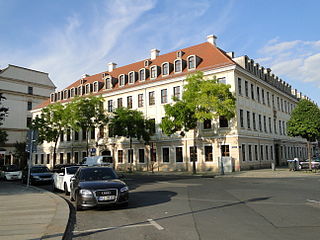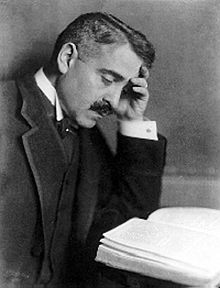
Aby Moritz Warburg was a German art historian and cultural theorist who founded the Kulturwissenschaftliche Bibliothek Warburg, a private library, which was later moved to the Warburg Institute, London. At the heart of his research was the legacy of the classical world, and the transmission of classical representation, in the most varied areas of Western culture through to the Renaissance.
The Hanseatic Goethe Prize was a German literary and artistic award, given biennially from 1949 to 2005 to a figure of European stature. The prize money was €25,000. On the occasion of Goethe's 200th birthday, the Freiherr vom Stein Foundation in Hamburg endowed a cultural prize "for important personalities in the intellectual life". The prize was awarded by the foundation of the Hamburg businessman Alfred Toepfer, Alfred Toepfer Foundation F. V. S..

The Theodor W. Adorno Award(Theodor-W.-Adorno-Preis) is a German award intended to recognize outstanding achievement in philosophy, theatre, music and film. It was established by the city of Frankfurt in 1977 to commemorate the sociologist and philosopher Theodor Adorno, who had taught at the University of Frankfurt for twenty years. The award is conferred every three years on 11 September, Adorno's birthday. The prize money is 50,000 Euro.
The Münchhausen Prize was instituted in 1997, the 200th anniversary of the death of the historical Baron von Münchhausen. It is awarded in May each year in Bodenwerder, the Baron's hometown, for special talent in the art of speaking or presentation, either in literature or the visual arts, fantasy and satire, in the sense of the Baron. The prize money is €2,556.
The KAIROS Prize has been awarded to European artists and scholars from the fields of visual and performing arts, music, architecture, design, film, photography, literature and journalism since 2007 by the Alfred Toepfer Foundation in Hamburg. It is endowed with a sum of 75,000 Euro.

Sigrid Weigel is a German scholar of literary studies, critical theory, a specialist of cross-disciplinary research, and a leading scholar of Walter Benjamin, Aby Warburg, and the cultural science (Kulturwissenschaft) around 1900. She held professorships at Hamburg, Zürich, and Berlin and established the internationally noted Advanced Studies “Center for Literary and Cultural Research” in Berlin. In 2016, she received the renowned Aby Warburg Prize of the City of Hamburg.

The Hanns Joachim Friedrichs Award is a German award for excellence in journalism. It was first awarded in 1995. The award is named for the German journalist Hanns Joachim Friedrichs, who died in the year before the awards had established. The winners of the award are journalists who have achieved exceptional results in their work. The prize money is €5,000.
Ernst-Toller-Preis is a Bavarian literary prize, awarded every two years in the name of Ernst Toller. The prize money is €5,000.
The Jakob-Wassermann-Literaturpreis is a Bavarian literary prize. It is granted in honour to the famous Jewish German writer Jakob Wassermann by the city of Fürth and comes with a donation of 10,000 euros. The prize was established in 1995.
Thomas Mann Prize is a literary prize of Germany. In full the title is "Thomas Mann Prize of the city of Lübeck and the Bavarian Academy of Fine Arts". It is given in alternate years in Lübeck and in Munich. The award is the product of a merger of two prizes in 2010, the Thomas Mann Preis der Hansestadt Lübeck and the Großer Literaturpreis of the Bavarian Academy of Fine Arts. The Thomas Mann Prize Lübeck was first awarded in 1975; the Great Literature Prize was first awarded in 1950. The prize money is €25,000.

The Edwin Scharff Prize has been awarded annually by the city of Hamburg since 1955, named after sculptor Edwin Scharff. The prize is awarded to artist who shaped the cultural life of Hamburg. The winners are chosen by a seven-member jury, which is appointed by the Senate. The prize money is €15,000.

The Sächsische Akademie der Künste is a German cultural organisation for the state of Saxony, based in Dresden.
The Reinhold-Schneider-Preis is the cultural prize awarded by the German town of Freiburg im Breisgau. It has been awarded biennially since 1960, alternating between literature, music and art. In addition to the main prize of €15,000, a Förderpreis (scholarship) of €6,000 is awarded. A connection of the recipient to Freiburg is essential, as was the case for the writer Reinhold Schneider, after whom the prize is named.
The Imke Folkerts Prize is a competition for artworks. The Prize consists of 10,000 euros and a special exposition of the short-listed artworks within the Greetsiel Week. The award began in 2004 and is given to artists every other year since the 2005 award. The award is open without any thematical restrictions to artists all over the world. Award ceremony is in the German fishing village Greetsiel.
The Bach Prize of the Free and Hanseatic City of Hamburg has been awarded since 1951, since 1975 every four years. On the occasion of the 200th anniversary of the death of Johann Sebastian Bach, the prize was founded in 1950 by the Senate and the Hamburg Parliament. The prize is endowed with €10,000 and is awarded to composers, whose works would meet the demands of Bach. €5,000 are earmarked for scholarships.
The Lessing Prize of the Free State of Saxony is a German literary award. It was founded in 1993 by the Government of the Free State of Saxony and is awarded every two years. It consists of a main prize, which honours outstanding achievements in the spirit of Gotthold Ephraim Lessing, especially in the field of literature, literary criticism and the theater. This prize is worth 20,000 euros. In addition, two further "promotional prizes" are awarded, which seek to publicly recognize and promote promising beginnings in these fields. These prizes are each worth 5,500 euros.
The Gottfried Brockmann Prize is a juried art prize, awarded every two years since 1985 by the city of Kiel in Schleswig-Holstein, Germany.
The Hegel Prize was founded by the city of Stuttgart in 1967 and has been awarded to a philosopher or humanities scholar every three years since 1970 in collaboration with the International Hegel Association. The prize was first awarded in 1970 on the occasion of Georg Wilhelm Friedrich Hegel's 200th birthday. The award is endowed with 12,000 euros. A jury decides on the award.
The Würth Prize of Jeunesses Musicales Germany has been awarded since 1991 to artists, ensembles or projects who implement Jeunesses Musicales Germany's (JMD) values and objectives in an exemplary manner. Together with the Würth Foundation, the JMD has been honoring individual personalities, ensembles and projects every year. The prize is presented in Künzelsau and endowed with 25,000 euros. The jury is made up of representatives from the Würth Foundation and Jeunesses Musicales Germany and is advised by the Deutscher Musikrat. The JMD is the German section of the Jeunesses Musicales International (JMI). It was founded during the Second World War to encourage encounters between young musicians.
The Prize of the Christoph and Stephan Kaske Foundation is an annual award for promotion of new music. It was founded in 1988 by Karlheinz and Christiane Kaske in memory of their sons Christoph and Stephan. The Christoph and Stephan Kaske Foundation has its legal seat in Munich. The aim is to promote young, promising interpreters and composers in the field of new music. The award is endowed with € 10,000. The selection of the winner is made by a board of trustees. The prize is awarded in a ceremony at the Künstlerhaus am Lenbachplatz.






